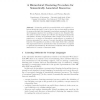78 search results - page 15 / 16 » Ontology Based Affective Context Representation |
WWW
2007
ACM
14 years 8 months ago
2007
ACM
Master data refers to core business entities a company uses repeatedly across many business processes and systems (such as lists or hierarchies of customers, suppliers, accounts, ...
AIIA
2007
Springer
14 years 1 months ago
2007
Springer
Abstract. A clustering method is presented which can be applied to relational knowledge bases. It can be used to discover interesting groupings of resources through their (semantic...
WWW
2003
ACM
14 years 8 months ago
2003
ACM
RDF-based P2P networks have a number of advantages compared with simpler P2P networks such as Napster, Gnutella or with approaches based on distributed indices such as CAN and CHO...
KBS
2007
13 years 7 months ago
2007
Commitment management is a key issue in service-provisioning in the context of virtual organisations (VOs). A service-provider — which may be a single agent acting within an orga...
ESWS
2006
Springer
13 years 11 months ago
2006
Springer
Abstract. Semantic Web Services were developed with the goal of automating the integration of business processes on the Web. The main idea is to express the functionality of the se...

